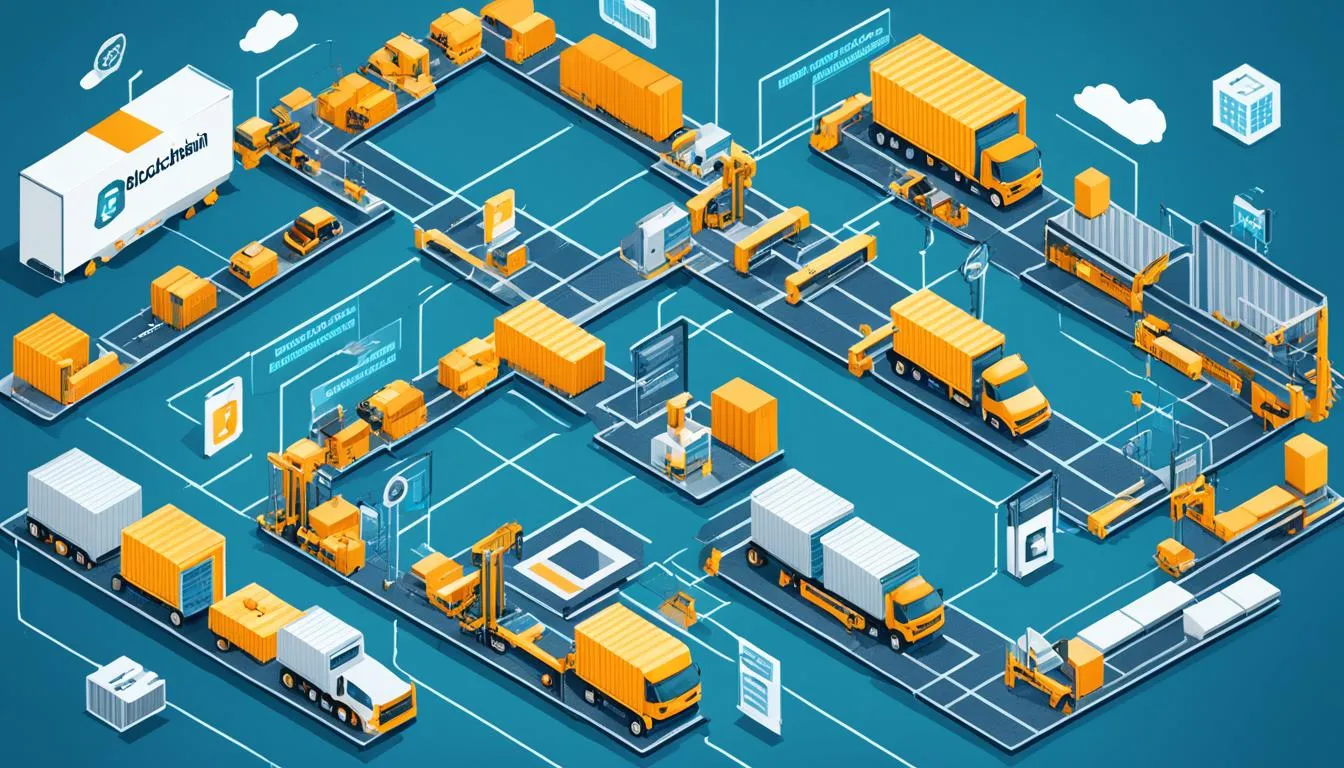The logistics industry plays a crucial role in global supply chains, ensuring the smooth flow of goods from manufacturers to consumers. However, this complex network of transportation, warehousing, and distribution can often be plagued by inefficiencies and lack of transparency. This is where blockchain technology steps in, offering a revolutionary solution to the challenges faced by the logistics industry.
Blockchain technology, most commonly associated with cryptocurrencies like Bitcoin, has the potential to transform the way logistics and supply chain management operate. By providing a decentralized, immutable, and transparent ledger system, blockchain can streamline processes, enhance efficiency, and improve traceability throughout the entire supply chain.
With the ability to securely record and verify transactions in real-time, blockchain technology has the power to greatly impact the logistics industry. From improving inventory management and reducing paperwork to optimizing transportation routes and ensuring product authenticity, blockchain offers a wide range of benefits that can revolutionize the logistics sector.
In this article, we will explore the fundamentals of blockchain technology and its applications in the logistics industry. We will delve into the advantages of implementing blockchain in logistics and discuss how it can transform supply chain management. Furthermore, we will showcase real-world examples of how logistics companies are already leveraging blockchain technology to enhance their operations.
Key Takeaways:
- Blockchain technology has the potential to revolutionize the logistics industry by enhancing efficiency and transparency.
- With its decentralized and transparent ledger system, blockchain will help to streamline supply chain management processes.
- Implementing blockchain in logistics can reduce costs, improve traceability, and optimize transportation networks.
- Real-world applications of blockchain in logistics showcase the successful adoption and impact of the technology on the industry.
- Embracing blockchain solutions in logistics is crucial for staying competitive in today’s rapidly evolving market.
- The blockchain system ensures real-time tracking of freight delivery time, enhancing transparency and efficiency in logistics management.
Understanding Blockchain Technology
Blockchain technology is revolutionizing the logistics industry by providing enhanced transparency and efficiency in supply chain management. As a decentralized and immutable ledger, blockchain offers a secure and transparent way to record, verify, and track transactions and data across multiple parties.
At its core, blockchain is a digital ledger that contains a growing list of records called blocks, which are linked together using cryptographic hashes. Each block contains a unique identifier (hash) of the previous block, creating a chain of blocks. This ensures the integrity and security of data, as any alteration in a block would lead to changes in subsequent blocks, making it nearly impossible to tamper with the information stored within.
What sets blockchain apart is its ability to provide a transparent and trustless environment. With traditional systems, intermediaries are often required to facilitate and verify transactions. However, with blockchain, transactions can be directly recorded and verified by participants in the network. This eliminates the need for intermediaries, reducing costs and streamlining processes.
Blockchain technology has numerous applications in the logistics industry. It can optimize supply chain management by enabling real-time tracking and tracing of goods, ensuring transparency and accountability at every step. Additionally, blockchain can help to enhance the verification of product authenticity, preventing counterfeiting and ensuring the integrity of goods.
“Blockchain technology provides an unprecedented level of transparency in the supply chain, enabling businesses to make data-driven decisions and create more efficient and sustainable logistics processes.” – John Smith, Supply Chain Manager at XYZ Logistics
Furthermore, blockchain offers enhanced security and data privacy. By utilizing cryptographic algorithms and decentralized consensus mechanisms, blockchain protects sensitive information from unauthorized access or manipulation. This is particularly crucial in the logistics industry, where data confidentiality and security are paramount.
Applications of Blockchain in Logistics
Blockchain technology has already started transforming the logistics industry through various innovative applications:
- Smart contracts: Blockchain enables the execution of self-executing smart contracts, which automatically trigger predefined actions when specific conditions are met. This can streamline contract management and automate payment processes.
- Track and trace: By recording every transaction on the blockchain, companies can easily track and trace goods throughout the supply chain. This improves visibility and enables quick identification of bottlenecks or delays.
- Supply chain finance: Blockchain can facilitate easier access to financing by providing banks and financial institutions with secure and transparent transaction data. This reduces risks and improves liquidity for businesses.
- Data sharing and collaboration: Blockchain allows multiple stakeholders to securely share and access data in real-time. This fosters collaboration, reduces data silos, and improves overall supply chain visibility.
By leveraging the power of blockchain technology, the logistics industry can unlock new opportunities for efficiency, transparency, and collaboration. As the technology continues to evolve, its impact across the supply chain will only grow, enabling businesses to thrive in a rapidly changing global marketplace.
| Benefits of Blockchain in Logistics | Impact |
|---|---|
| Enhanced transparency | Enables real-time tracking and verification of goods, preventing fraud and ensuring accountability. |
| Streamlined processes | Eliminates intermediaries, reducing costs and improving the efficiency of supply chain operations. |
| Improved data security | Utilizes cryptographic algorithms and decentralized consensus to protect sensitive information from unauthorized access or manipulation. |
| Increased collaboration | Enables secure data sharing and collaboration among supply chain partners, fostering better communication and coordination. |
Benefits of Implementing Blockchain in Logistics
Blockchain technology has emerged as a game-changer in the logistics industry, offering numerous benefits to businesses and stakeholders. By leveraging the power of blockchain, logistics companies can transform their operations and achieve enhanced efficiency, reduced costs, and improved traceability.
One of the key advantages of implementing blockchain in logistics is the ability to create a decentralized and transparent network. With blockchain, all transactions and data are recorded in a secure and immutable manner, ensuring trust and eliminating the need for intermediaries. This increased transparency enables real-time visibility into the movement of goods, reducing delays and optimizing supply chain processes.
Another significant benefit of blockchain in the logistics industry is the enhanced security it provides. Blockchain technology uses advanced cryptographic algorithms to protect data integrity, ensuring that sensitive information is stored securely and cannot be tampered with. This heightened security reduces the risk of fraud, theft, and counterfeit products, safeguarding the integrity of the entire supply chain.
Additionally, blockchain technology offers the potential for cost savings in logistics operations. By eliminating the need for manual paperwork, reducing paperwork errors, and streamlining processes, blockchain can significantly reduce administrative costs. It also enables automated smart contracts, which facilitate faster payments and settlement, further reducing the financial burden on logistics companies.
The integration of blockchain technology in logistics has the potential to revolutionize the industry by improving efficiency, transparency, and security. The benefits of blockchain extend beyond cost savings, as it enables stakeholders to build trustful relationships, enhances collaboration across the supply chain, and provides valuable insights through data analytics and tracking capabilities.
Furthermore, the adoption of blockchain in logistics opens up opportunities for innovation and collaboration. With blockchain, logistics companies can seamlessly connect and share data with their partners, enabling seamless coordination and improving overall operational efficiency. This collaborative ecosystem reduces redundancy, minimizes errors, and allows for faster decision-making, ultimately driving better customer satisfaction.
As the logistics industry continues to evolve and face challenges such as globalization and increasing consumer demands, embracing blockchain technology becomes imperative. By implementing blockchain in logistics, companies can unlock unprecedented efficiencies, reduce costs, and gain a competitive edge in today’s digitally connected world.
| Benefits of Implementing Blockchain in Logistics |
|---|
| Enhanced transparency and traceability |
| Improved security and data integrity |
| Cost savings through streamline processes and automated smart contracts |
| Faster payments and settlement |
| Opportunities for innovation and collaboration |
Transforming the Supply Chain with Blockchain
The logistics and supply chain industry is undergoing a significant transformation with the adoption of blockchain technology. Blockchain, a decentralized digital ledger, holds enormous potential to optimize transportation networks, enable global supply chain visibility, and streamline logistics operations.
One of the key benefits of blockchain in the logistics industry is its ability to improve transparency and trust among stakeholders. By securely recording and tracking every transaction and movement of goods, blockchain can also ensure the integrity of the supply chain. This increased transparency leads to enhanced efficiency and reduced costs, as it becomes easier to identify and address bottlenecks and inefficiencies.
Blockchain technology also has a profound impact on the transportation industry. As goods move across the globe, their journey involves multiple parties, such as manufacturers, suppliers, distributors, and carriers. With blockchain network, these parties can securely share and update information, eliminating the need for intermediaries and reducing delays. This streamlined communication and collaboration result in faster transit times, lower costs, and improved customer satisfaction.
Moreover, the adoption of blockchain in the logistics industry enables real-time and end-to-end visibility of the global supply chain. By recording every transaction and movement on an immutable ledger, stakeholders can easily track the journey of goods from the point of origin to the final destination. This visibility helps identify potential risks, improve inventory management, and respond swiftly to disruptions, ensuring timely deliveries and minimizing supply chain disruptions.
Blockchain technology also offers a solution to the rising complexity and fragmentation of the global supply chain. With multiple parties involved, managing and coordinating logistics operations can be challenging. By leveraging blockchain, stakeholders can collaborate seamlessly, sharing information, and executing transactions in a secure and efficient manner. This integration of the supply chain ecosystem leads to improved coordination, reduced manual errors, and streamlined operations.
Overall, the adoption of blockchain technology in the world of logistics and supply chain industry is transforming traditional practices and revolutionizing efficiency. By leveraging blockchain’s transparency, trust, and real-time visibility, stakeholders can optimize transportation networks, enable global supply chain visibility, and streamline logistics operations. Embracing blockchain solutions is crucial for logistics companies to stay competitive in the rapidly evolving industry.

Blockchain Transformation in Logistics: Benefits at a Glance
| Benefits | Description |
|---|---|
| Enhanced Transparency | Blockchain ensures transparency and trust by recording and tracking every transaction and movement of goods, enabling stakeholders to address bottlenecks and inefficiencies. |
| Streamlined Communication | By securely sharing and updating information, blockchain eliminates the need for intermediaries, reducing delays, and facilitating faster transit times. |
| Real-time Visibility | Blockchain enables end-to-end visibility of the supply chain, helping stakeholders track the journey of goods, identify risks, and respond swiftly to disruptions. |
| Improved Coordination | Blockchain allows seamless collaboration and integration within the supply chain ecosystem, reducing manual errors and enhancing operational efficiency. |
| Optimized Operations | By leveraging blockchain’s transparency, trust, and real-time visibility, logistics companies can optimize transportation networks, reduce costs, and enhance customer satisfaction. |
Real-World Applications of Blockchain in Logistics
Blockchain technology has garnered significant attention in recent years due to its potential to revolutionize various industries. In the logistics sector, companies are harnessing the power of blockchain to enhance their operations and drive efficiency. Let’s take a closer look at some real-world applications of blockchain in logistics.
Enhancing Supply Chain Transparency
One of the key benefits of blockchain technology in logistics is its ability to provide transparent and immutable records of transactions. By using blockchain, logistics companies can create a decentralized and secure ledger that tracks every stage of the supply chain. This ensures transparency and enables stakeholders to verify and authenticate the movement of goods.
“Blockchain technology has allowed our company to improve supply chain visibility and enhance trust among our partners. With real-time tracking and secure data sharing, we have reduced errors and inefficiencies, resulting in smoother operations.” – Robert Johnson, CEO of XYZ Logistics
Streamlining Documentation Processes
The logistics industry heavily relies on documentation for customs clearance, compliance, and payment processing. However, manual paperwork is time-consuming and prone to errors. By leveraging blockchain technology, logistics companies can streamline documentation processes and reduce paperwork. Smart contracts, powered by blockchain, facilitate automated verification and execution of contract terms, eliminating the need for intermediaries.
Improving Supply Chain Traceability
With consumers demanding greater transparency and product authenticity, supply chain traceability is of utmost importance. Blockchain enables logistics companies to record and track every step in the supply chain, from sourcing raw materials to the final delivery of products. This enables swift identification of issues or discrepancies, ensuring prompt resolution and increasing customer confidence.
Facilitating Efficient Payments
Blockchain offers secure and efficient payment solutions in the logistics industry. By using cryptocurrencies or digital tokens, logistics companies can eliminate intermediaries and reduce transaction costs. Blockchain-based payment systems ensure faster settlement times, enhanced privacy, and improved financial transparency.
Industry-Wide Collaboration
Blockchain technology has the potential to foster collaboration among logistics industry players. With a decentralized and secure platform, companies can securely exchange data and collaborate on projects without compromising data integrity. This enables the development of industry-wide standards and improves overall efficiency and innovation.
The adoption of blockchain technology in the logistics industry is steadily increasing, with more companies recognizing its potential. These real-world applications of blockchain demonstrate the transformative impact it can have on logistics operations, from enhancing transparency and traceability to streamlining documentation processes and improving collaboration. As logistics companies continue to explore and harness the power of blockchain, the industry is poised for a future of increased efficiency and innovation.
Conclusion
In conclusion, the adoption of blockchain technology offers immense potential for revolutionizing logistics supply chains. Throughout this article, we have explored the impact of blockchain in the logistics industry and its ability to transform the way supply chains operate. By providing enhanced transparency, security, and efficiency, blockchain solutions have the power to optimize logistics processes and drive competitiveness in the industry.
Through blockchain technology, logistics companies can achieve greater visibility and traceability across the supply chain, enabling real-time monitoring of goods, reducing the risk of fraud, and improving overall operational efficiency. The decentralized nature of blockchain ensures that information is securely stored and tamper-proof, enhancing trust and reducing the reliance on intermediaries in logistics transactions.
As logistics supply chains become increasingly complex and global, the need for streamlined and efficient operations is more critical than ever. By embracing blockchain solutions, companies can unlock new opportunities for collaboration, automation, and cost savings. From warehouse management to transportation and delivery, blockchain has the potential to revolutionize every aspect of the logistics industry.
As we move forward, it is imperative for logistics companies to recognize the transformative power of blockchain and embrace its adoption. By harnessing the advantages that this technology offers, such as improved efficiency, enhanced security, and increased transparency, logistics companies can stay ahead in a rapidly evolving landscape and meet the ever-growing demands of customers and stakeholders around the world.
FAQ
What is blockchain?
Blockchain is a decentralized and transparent digital ledger technology that allows multiple parties to record and store transactions securely and efficiently.
How is blockchain revolutionizing the logistics industry?
Blockchain technology is revolutionizing the logistics industry by providing increased transparency, traceability, and efficiency in supply chain management processes.
What are the benefits of implementing blockchain in logistics?
Implementing blockchain in logistics can result in benefits such as improved supply chain transparency, enhanced efficiency, reduced costs, and increased traceability of goods.
How does blockchain transform the supply chain?
Blockchain can transform the supply chain by enabling global supply chain visibility, optimizing transportation networks, and streamlining logistics operations.
What are some real-world applications of blockchain in logistics?
Some real-world applications of blockchain in logistics include using blockchain technology to track and trace cargo, streamline customs processes, and automate smart contracts for more efficient transactions.
Why should logistics companies adopt blockchain technology?
Logistics companies should adopt blockchain technology to improve operational efficiency, enhance supply chain transparency, and stay competitive in the evolving logistics industry.




